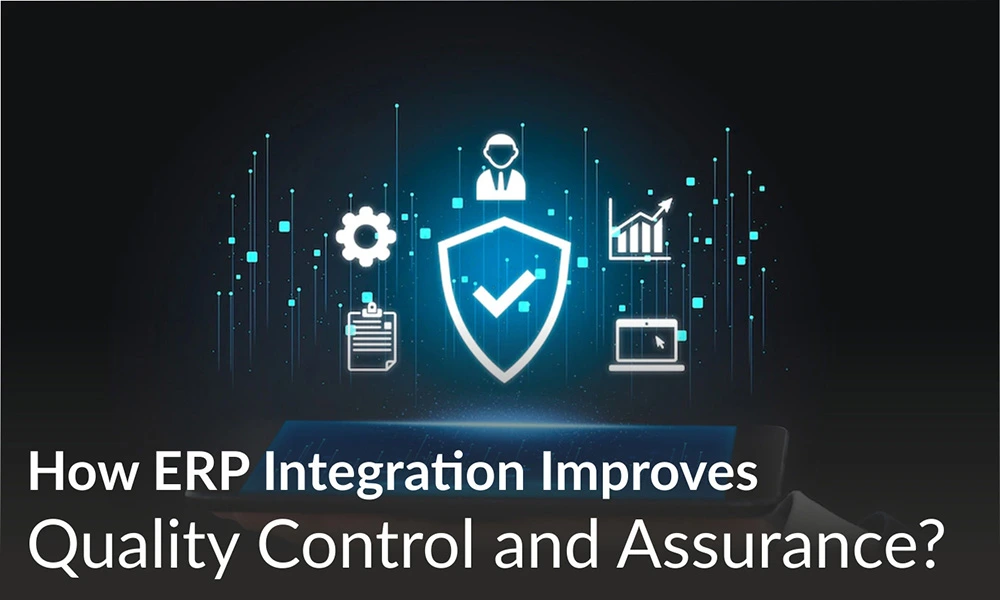Research shows approximately 92% of product manufacturers believe that their product’s quality significantly affects customer satisfaction and therefore the overall success of their business. In such a case, maintaining and improving the quality standards of each product is of utmost importance for any manufacturing business. Here’s where quality assessment becomes necessary and manufacturers can use a business process streamlining software to help simplify their functions and make them efficient
The Enterprise Resource Planning (ERP) Software provides real-time data tracking and tracing, centralized data storage, and integration of all business functions. Various modules are designed to streamline the functions of each department.
What is the Quality Control and Assurance Module in ERP?
The Quality Control & Assurance module helps to ensure that material, stores, and production modules are synced with quality checks.. It helps you set the control parameters for products and processes. This module maintains a record of quality checks for all material that is received from suppliers and sent to customers. It records the reasons for rejections and thus helps you to assess a supplier or process closely. The quality control module also keeps a check on the production quality of ongoing work orders on shop floors. Thus, using ERP for quality control helps to manage and maintain the overall quality of products.
Let us understand in detail how ERP integration in businesses can help quality-related functions.
How Can Businesses Leverage ERP for Quality Control and Assurance?
1. Maintain Standardisation
Business defines quality metrics to ensure that product specifications are consistent and precise. This platform allows the process owner to automate function like audit of incoming material to check if the quality standards confirm with your business needs. ERP software allows you to monitor quality pertaining to raw materials and finished products for materials coming in and products going out. The module also ensures that supply chain functions are executed with similar performance indicators and metrics. Thus, with real-time tracking and a centralised database, it becomes easier to maintain the set standards across products and processes.
2. Improves Customer Satisfaction
The customers expect quality products and services from the providers they pick. Businesses use the Quality Control and Assurance module during all stages of production to ensure that they meet their expected quality standard. Insights from this database help to understand improvement areas to channelize efforts in right direction. ERP solutions help businesses manage the quality right from the procurement of raw materials to production, and eventually distribution. Having an ERP ensures that only acceptable standard products are sent out of the production facility, ensuring 100 % customer satisfaction.
3. Define Testing Criteria
ERP for quality control allows you to define different parameters for testing, based on your business/customer needs. The Quality Control module in ERP is then configured to help automate functions like test mapping, tolerance percentage, test parameters, generating test results and more. Products that fail the test are added to the rejected list and processes as per the SOPs.
4. Quality Inspection of Products
Manufacturers perform quality testing on each product on the production line. With integration of ERP, users can generate test reports, link test results to production or purchase orders, and due dates can be set for all tests. ERP integration in the business allows access to test results for everyone in the company based on their access permissions.
5. Supplier Relationships
To maintain high quality, it is imperative to closely monitor the set standards and compliances followed by the suppliers. It is a challenge especially for the companies to keep a close eye on suppliers. However, integrating a discrete manufacturing ERP solution provides an update on quality metrics and inbound shipment inspections as well. The notifications keep managers informed about delays and related issues. ERP maintains a record of suppliers’ lead time and delivery, giving an overview on performance history of the suppliers. The ERP software thus helps managers to choose reliable suppliers and maintain quality and compliance in the supply chain.
6. Compliance
Complying with regulations and standards is an imperative part of Manufacturers must ensure to comply with required regulations. The Quality control and assurance module of an ERP solution allows manufacturers to set a strong foundation for compliance. It helps businesses meet the mandates related to packaging, manufacturing, and handling products. The quality assurance module manufacturers deliver high productivity without compromising on standards.
New Horizon‘s Quality Control & Assurance Module enables quality check for material received from vendors against labour production and delivery challan, finished goods, subcontracted items, and more. Our discrete manufacturing ERP software is made for manufacturers to have control and visibility over their business processes. The smooth integration of our ERP software, the training by our experts, and our customer service add up to make us one of the leading providers of ERP for SMEs and MSMEs in India. New Horizon ERP by SourcePro is an efficient platform to maintain quality production while streamlining business processes.
Get in touch with our experts, who can help you customise an ERP solution according to the needs of your business.
